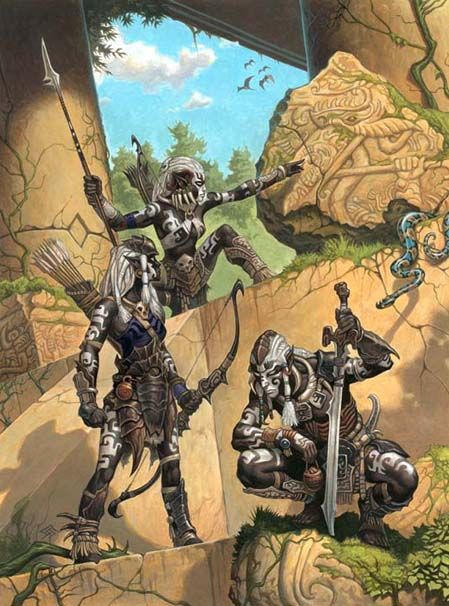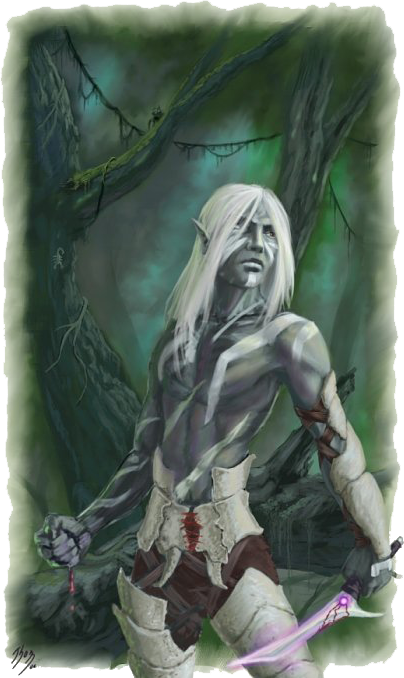
Nature: Elf Subrace
Type: Humanoid
The elves of Aerenal trace their origin to the mysterious shores of Xen'drik, where their 'cousins', the dark-skinned elves called "drow", still live among the ruins of the empires of the giants. The tribes of the drow are the most advanced society in Xen'drik, and their way of life has managed to survive for thousands of years despite the mystical curses afflicting the realm.
The drow carve a deadly existence out of the ruined continent they call home. These dark-skinned elves believe it is they, not the pale-skinned rebel offshoots who fled to Aerenal, who truly preserve the dignity and valor of the elf race. Allied with monstrous scorpions, the drow battle the fallen race of giants over the ruins of the mysterious continent.
As the most civilized inhabitants of ruined Xen'drik, the drow are the heirs to both the lingering might of giant nations and the ancient elven spellcraft once learned at the feet of dragons.
The homeland of the drow is a contradiction of sorts — an ancient ruin that nonetheless holds magical treasures of almost unimaginable might. As Siberys shards fall on the broken landscapes and jungles, explorers from other continents brave sahuagin-filled waters to crowd the port city of Stormreach.
.
Life & Society
The jungles of Xen'drik are a harsh and unforgiving land; covered by thick jungle and the ruined cities of the ancient giant kingdoms, the continent houses too many dangers for the drow to be able to establish large and stable cities.
Drow settlements are small, temporary affairs. Occasionally a relatively large and powerful tribe might stay for some time in the ruins of a giant city, but such occupations are short-lived. The drow stay only long enough to plunder what artifacts they can.
Drow have few of the political struggles and rivalries that the other humanoid races have. Family groups are simply too small and scattered to have anything other than sporadic contact. This intermittent contact is fraught with peril, though, as larger and more powerful family groups seek to absorb smaller groups of drow.
Most drow have little interaction with members of other races; they fight the giants and monsters that roam their savage continent, and even avoid other drow family groups when possible. Drow are very suspicious of outsiders, and the few who interact with other races do so through the port of Stormreach.
When dealing with outsiders, drow reveal nothing of themselves or their family groups whenever possible, always attempting to use the outsiders for their own ends without exposing the secrets of Xen’drik. For this reason, members of other races often find the drow to be a suspicious and sinister group.
.
The Drow Cultures

For many people, the name “Xen’drik” conjures images of tattooed drow sacrificing hapless explorers to scorpion idols. These stories might be rooted in truth, but judging the drow on the basis of these few encounters is like making a judgment about humanity based solely on a visit to Flamekeep.
Drow civilization takes many forms: The Umbragen drow fight a war in Khyber, while the Sulatar bind elementals in ancient giant cities. The Qaltiar tribes dedicate themselves to hunting giants. Others devote themselves to tribal feuds, pursuing vendettas that have lasted for thousands of years.
The Vulkooridal — the scorpion-worshipers featured in most tales — are the dominant drow culture along the northern coast, but they come from a mass of nomadic tribes, each with its own unique customs. Some are dedicated solely to the Scorpion, while others see Vulkoor as just one of the many spirits of the natural world.
All of these are more or less entirely separate cultures, much like the Tairnadal elves of Valenar are considerd to be distinctly different from the elves of Aerenal, and only ignorant foreigners fail to realize that Xen'drik has just as much cultural breadth and diversity as the so-called "civilized" lands in the north.
.
The Vulkooridal
These are what most khorvairians consider tp be "typical" drow: Dark-elves who worship a scorpion-god named Vulkoor, a deity who is often envisioned as a giant scorpion or as a hybrid with the head, arms, and upper torso of a strong male drow and the lower body of a scorpion. Many drow believe that Vulkoor and the Mockery of the Dark Six are one in the same.
These drow also revere scorpions, considering other arachnids to be lesser servitors of Vulkoor. The drow tribes of Xen'drik ritually scar themselves using scorpion venom, leaving white tattoos on their black skin.
.
The Sulatar
These are fanatical devotees of doctrines taught to them in the ancient times by Fire Giants, and their beliefs are obsessed with fire in all its forms. They are master of the art of elemental binding involving fire-beings, and believe in a fiery apocalypse that is to come, wherein the Sulatar themselves will be exalted for their devotion.
.
The Umbragen
When the dragons devastated Xen'drik, the ancestors of the Umbragen fled into Khyber. They established a city-state beneath an area known as the Ring of Storms. Khyber is a deadly place, and in their quest for survival these drow established a spiritual bond to a dark force known as the "Umbra", bartering a piece of their race's soul in exchange for power.
For thousands of years this situation persisted, but over the last decade a new enemy has risen in the depths — the army of the daelkyr lord Belashyrra. The Umbragen are fighting a losing battle in the darkness, and they are desperate to find a way to keep their city and their pride. Umbragen strike teams are exploring Xen’drik in search of weapons, and more and more often teams of adventurers encounter Umbragen seekers below Stormreach, or cross paths with Umbragen spies in the city itself. Drow pride won’t let them ask strangers for assistance, but the Umbragen might try to trick adventurers into fighting their foes.
Because of their connection with the Umbra, Umbragen drow frequently have sorcerer levels and spells tied to darkness or cold. They are more civilized than the Vulkooridal and use metal weapons and armor, often magical.
.
Urban Drow
A few dozen drow can be found scattered around Stormreach. Some serve as wilderness guides or find other ways to make an honest living. However, many turn to violence or a life in the shadows, dying in alleys or on the sand of the Red Ring. The majority of urban drow are exiles from Vulkoori tribes, driven out for terrible crimes or breaking taboos. However, in the harsh world of the drow, mercy is considered a crime, and drow who don’t subscribe to their race’s ruthless ways come to the city to escape the cruel life of the wilds.
Most of the drow within the city are settlers from scattered tribes. Old feuds remain strong even when the tribe has been left behind, and urban drow rarely seek the company of others of their kind unless they come from the same tribe. Some have found love within the city, whether temporary or long-term, and a handful of half-drow make their homes in Stormreach as well.
.
Language
Drow speech is related to Elven in many ways, but the two races have been separate for such a long period that even their languages have grown apart. By now, "drow elven" and "aereni elven" have become separate languages, though people in Khorvaire and Aerenal tend to refer to these two languages (incorrectly) as "drow" and "elven".
.
Names
They typically have only 2 names, a personal name and a family name. Dark elves are very careful about sharing their family names, and it is considered an insult in drow society to ask about a family name. Among dark elves, sharing a family name is sometimes a sign of trust and friendship, but more often it is a sign of submission to a more powerful individual.
Dark elves guard their family names so carefully not because of any personal danger or need, but because family is the ultimate source of loyalty for any dark elf; a dark elf never wants to give away any information that might weaken the family.
Their proper and family names feature multiple syllables, hard consonants, and glottal stops (represented by apostrophes).
Male examples: Ek'ann, Kaxxar, Xen'kar
Female examples: Curra, Kas'asar, Kirris, Xen'va
Family examples: Gen'thac, Torkak, Xar'cha





